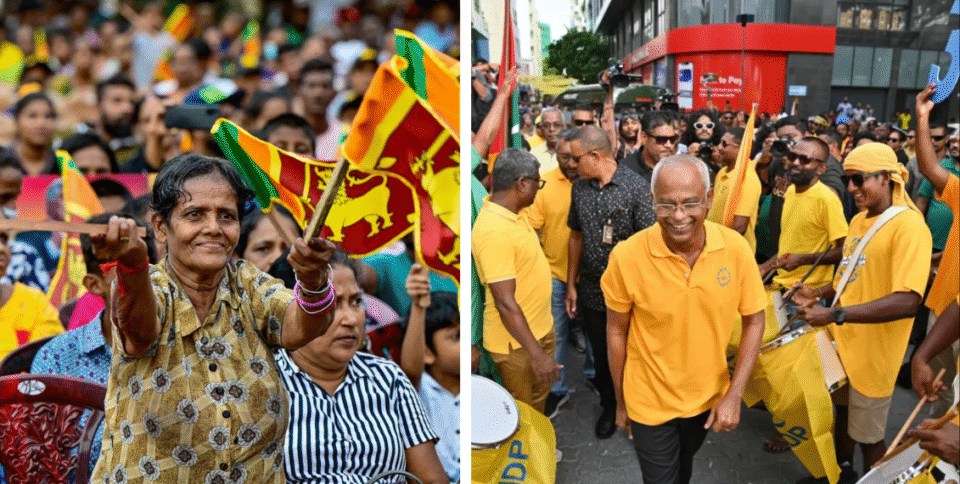This grassroots initiative, led by the National Peace Council (NPC) The National Peace Council of Sri Lanka (NPC),PAFFREL in collaboration with , Association of War Affected Women (AWAW) Association of War Affected Women, Centre for Communication Training (CCT) CIVITAAS – Empowering Civil Society: Enhancing Capacity and Sustainability, and Women & Democracy Leading Women NGO in the Maldives championing women’s empowerment and gender equality.
A Growing Disenchantment with Dynasties
The most striking finding of the survey is the rejection of dynastic politics by a majority of voters, particularly among the youth. In Sri Lanka, over 60 percent of respondents expressed a deep mistrust in political parties, many of which are controlled by a handful of powerful families. In the Maldives, more than half of those surveyed said they would support the introduction of a “None of the Above” (NOTA) option on the ballot—an indicator of disillusionment with traditional candidates.
In both countries, over 70 percent of voters under 35 said that they valued ‘honesty, policy knowledge, and problem-solving ability’ far more than a leader’s lineage. For these voters, good governance now trumps name recognition.
For nations accustomed to inherited power, this shift is seismic. In Sri Lanka, the Rajapaksa dynasty—once lauded as war heroes—imploded under the weight of economic mismanagement and authoritarianism. Gotabaya Rajapaksa’s presidency ended amid mass street protests in 2022, as fuel shortages, food crises, and debt defaults pushed millions into survival mode. The public uprising, known as Aragalaya, marked a dramatic turning point: a popular revolt not just against one leader, but against the very culture of political entitlement.
The Maldives tells a similar tale. The country spent over three decades under the autocratic rule of Maumoon Abdul Gayoom, only to see the baton passed to his half-brother Abdulla Yameen, whose tenure was marked by democratic backsliding and corruption. The 2018 election—won by an opposition coalition—was a watershed moment driven by voter anger over repression and nepotism. Since then, political engagement has only grown, particularly among youth and civil society.
What the Survey Tells Us About Change
The Active Citizens survey offers compelling evidence that democracy is no longer seen as a mere electoral exercise, but as an ongoing civic responsibility. Some of the key insights from the final report include:
- A significant decline in support for dynastic politics: Less than one-fourth of voters now consider family legacy a relevant factor in choosing their leaders.
- High demand for electoral reform: Nearly 70% of respondents across both countries demanded stronger rules around campaign financing, fair media access, and stricter penalties for vote buying.
- Growing role of youth and women: Women’s participation and youth activism emerged as crucial drivers of democratic awareness. Over 80% of women surveyed said they would support legal mandates to ensure women’s representation in political leadership.
- Public distrust in political parties: While elections remain central to democratic participation, traditional parties are viewed with suspicion. In Sri Lanka, only 20% of voters believed political parties worked in the public interest.
From Personality to Performance
Why are voters now turning away from dynasties? The answer lies in a combination of disillusionment and empowerment.
Crises have played their part. In Sri Lanka, the economic collapse brought the consequences of poor leadership into sharp relief. The perceived impunity of the ruling family became intolerable when citizens were queueing for kerosene and children were fainting from hunger in school.
In the Maldives, democratic backsliding under the Yameen regime sparked fear that the nation’s fragile transition to democracy might be reversed. Activists, journalists, and ordinary citizens fought back through public forums, social media, and grassroots campaigns. The result was a strengthened democratic movement and a call for more inclusive governance.
Technology and civic education have also empowered citizens. The rise of digital platforms has created spaces for debate and dissent, even in tightly controlled environments. Information travels faster, leaders are more visible—and more accountable.
A Regional Awakening?
What’s happening in Sri Lanka and the Maldives reflects a larger trend in South Asia. The once-unassailable Nehru-Gandhi dynasty in India now struggles for relevance among younger voters. In Pakistan, the Bhuttos and Sharifs face growing skepticism over entrenched corruption. In Bangladesh, the political space once dominated by Sheikh Hasina and Khaleda Zia is witnessing calls for generational change.
The decline of dynastic loyalty marks a broader shift in voter expectations. Citizens across South Asia are less interested in who you are—and more interested in what you deliver.
A More Demanding Democracy
The final takeaway from the Active Citizens survey is both hopeful and challenging. Citizens are reclaiming their role in democracy, not as passive voters but as active participants. However, this awakening brings new responsibilities for governments and political institutions.
To sustain this momentum, reforms must follow. That includes campaign finance transparency, internal party democracy, protection of press freedoms, and stronger civic education. Without such structural changes, public enthusiasm could falter, and disillusionment could return.
But for now, the message from the streets of Colombo to the shores of Malé is clear: the era of automatic dynastic rule is fading, and a new chapter—one built on performance, participation, and principle—is beginning to take hold.

